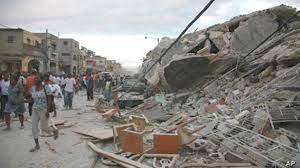Haiti Remains In ‘Acute Political Crisis,’ Envoy Tells Security Council
Central America, Latest Headlines Saturday, February 19th, 2022
(AFRICAN EXAMINER) – UN envoy, Helen La Lime, says Haiti remains in “acute political and institutional crisis’’ despite some signs of progress in ending the political, economic and humanitarian crises in the country.
Lime, head of the United Nations Integrated Office in Haiti (BINUH), told the Security Council on Friday that the crisis Haiti had worsened across the country.
She said the crisis had worsen since the assassination of its president, President Jovenel Moïse and the situation there remained “fraught and highly polarised.”
Special Representative Lime, outlined the need for structural reforms to tackle gang violence, address impunity and corruption, strengthen the justice system and sustainably transform the economy.
“The contours of a common vision shared by all, will ultimately depend on Haitian stakeholders placing the national interest above their own aspirations.
“Success will be determined by their collective willingness to compromise,” she said.
She added that the relative calm observed on Feb. 7 – the date on which late President Jovenel Moïse’s term would have officially ended – was a good sign, telling ambassadors that the new government, unveiled on Nov. 24, 2021 appeared to have appeased tensions.
And while awaiting a revised electoral calendar, the BINUH chief noted that momentum seemed to be building around “an inclusive, credible and effective Provisional Electoral Council.”
According to her, gang violence continues to plunge major urban centres into lawlessness and grief while criminal armed groups have a strong hold on the economic and social lives of millions.
Although the Haitian National Police has tried to stem the wave of violent crime, the “over-stretched, understaffed, and under-resourced police force, cannot on its own curtail the alarming rise in gang-generated insecurity,” she said.
Against this backdrop, the UN and Haitian government have jointly resolved to strengthen international support, epitomised by the imminent creation of a multi-donor basket fund.
The UN official commended the Haitian authorities on a national community violence reduction strategy that has, after years of closures, resulted in the reopening of several schools in the Port-au-Prince neighbourhoods of Cité Soleil and La Saline.
“These successes offer hope that resolute and coordinated government actions will lead to the provision of additional basic services in these communities, as well as to their extension to other areas,” she said.
The Special Envoy cited the 2020 assassination of Monferrier Dorval, the 2018 massacre in La Saline, and the “ghastly assassination” of President Moïse, whose stalled murder investigation has exacerbated “both suspicion and mistrust within the country.”
The Haitian judicial system suffers from “grave structural weaknesses” she said, that crippled the courts’ ability to “investigate, process and try cases.”
And while modest signs of progress are encouraging, more action is needed for new penal and criminal codes, and to ensure that judicial reform can be sustained over the longer-term.
“It is now estimated that 4.9 million people, or 43 per cent of the country’s population, will be in need of humanitarian assistance in 2022,” she stated.
Pointing to Wednesday’s international donors’ conference, she expressed deep gratitude for 600 million dollars in pledges for the Integrated Reconstruction Plan to rebuild the heavily damaged areas.
This month marked three consecutive years without a laboratory-confirmed case of cholera in Haiti, a “watershed moment” representing “a significant step” towards eliminating the disease in the country, according to the Special Envoy.
She credited the “unwavering dedication” of the country’s frontline workers along with UN, bilateral and multilateral organisations partnerships.
She, however, advised all Haitian leaders to engage constructively with one another to steer the country towards elections and emerge from the “acute political and institutional crisis” in which it has been plunged.
And the international community must also continue to engage with the government and others to create security and political conditions to hold national elections and ensure structural reforms.
“Now is not the time to let Haiti fall off the agenda,” the Special Envoy stated.
NAN
Related Posts
Short URL: https://www.africanexaminer.com/?p=73942




















